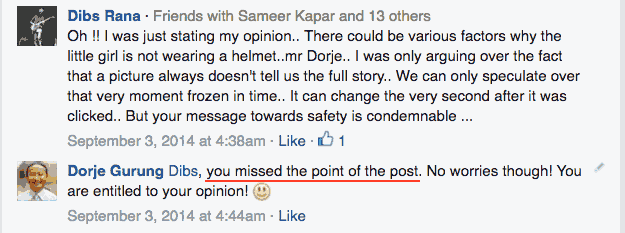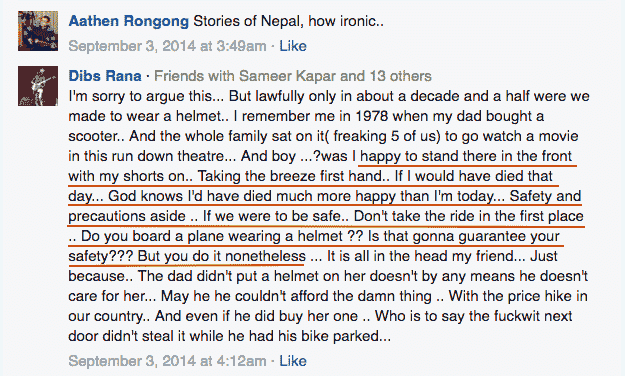As per my long-held dream, I have been busy working on the education of marginalized Nepalese since returning to Nepal in May 2013. One of the things I am doing to that end is figuring out how to improve the abysmal quality of government (public) school education where most Nepalese send their children.
Elsewhere, I have talked about how a small change in the teaching method can have a huge impact on the students’ learning outcome, especially those attending government schools.
Back in September 2014, I decided that another way of improving the value of Nepalese school qualifications is by teaching philosophy!
After making the above Facebook post, I argued for it in the blog post The Blinding Effect of Structural Privilege.
It is clear that the Nepalese people, from average Joes in the streets to social media users to political leaders and bureaucrats, struggle with the use of logic.
That is not surprising since our education system teaches students to rote learn and regurgitate contents of prescribed textbooks.
Even in Science and Mathematics for instance, Nepalese students are taught to use a formulae or a rule or a principle to solve problems. Science students are rarely taught how to analyze information/data, draw conclusions and evaluate the conclusions using logical deductions, which however was something I used to do with my own students in my previous incarnation as a science teacher.
The inability to use logic becomes problematic in everyday life for Nepalese when, for instance, discussing important issues (e.g. patriarchy and gender issues, systemic and institutional discrimination, caste-based discrimination) or discussing serious topics (e.g. caste system, poverty, social justice, structural privilege, structural inequality).
During my years at the United World College of The Adriatic in 1990 I discovered that debates and discussions, whether inside or outside of a classroom, help one to learn about oneself and others and promote personal, professional and intellectual growth and development.
What follows is a part reproduction of an exchange I had with a fellow Nepalese on Facebook. The exchange — over whether pillion riders of motorbikes should wear helmets — demonstrates why the ability to understand someone else’s argument and to give a logical and reasonable rebuttal would have helped the person who chose to engage with my post.
Incidentally, since the Facebook post is a public post and anyone can follow the link and read the original exchange, I have not bothered to redact any names.
It was obvious that he hadn’t really gotten the point of my post. He wasn’t making much sense either.
Realizing that responding to any of his tangential and poorly stated and argued points would have been the same as having a debate with a drunk, I didn’t bother…except to say

Not surprisingly, he responded by making an obvious point unrelated to THE point I had made in my original post AND characterising my concern for safety as “condemnable”!!
(Incidentally, the above exchange inspired the blog post Use Your Head, Protect Your Head.)
(Having said that, in spite of evidence to the contrary, I am willing to entertain the possibility that he might NOT have attempted to make any kind of argument! Or the possibility that he may actually have the requisite skills but chose not to demonstrate them.)
The ability to argue — to make a case for your opinion, to have an intellectual conversations, to debate/discuss — where your ability to reason are tested and are on display, would also be a useful skill to counter the highly stratified society of Nepal.
Tradition and culture of the country expects almost-blind obeisance to those in positions of power and/or respect — social, political, economic…you name it. They may have acquired, or ascended to, those positions through birth and/or family name and/or family wealth or through personal endeavours etc. But, the very peculiar Nepalese “art-form” of kissing ass, a particularly unsavoury practice of obeisance many display under a host of different circumstances toward those in power and influential positions, is partly hindering social and economic progress.
Don’t get me wrong, I am all for giving respect to people who have earned it! There is, however, a fine line between earned respect and everything else.
And it’s for that same reason that I don’t demand respect of others.
I must be able to logically justify my respect for a person just as I expect others to do the same when it comes to me.
What do you think? Want to start a discussion? 🙂 Please be my guest…comment away below!


